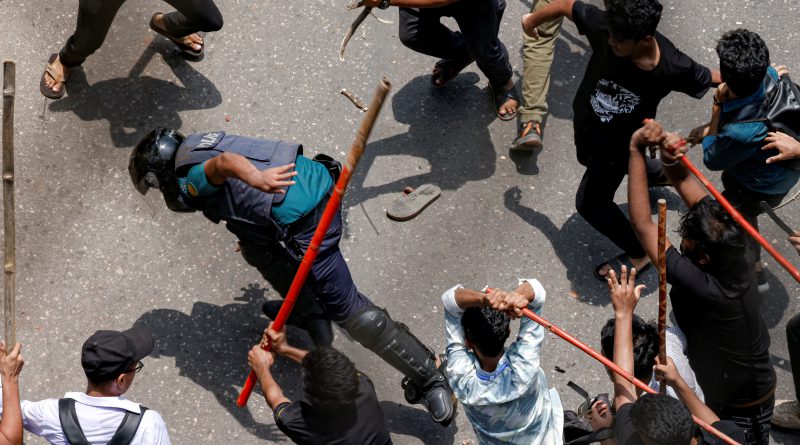Bangladesh Turns into a Haven of Anarchy: The Grim Failure of the Interim Government
This situation also reflects a collapse of the justice system. A culture of impunity has taken root, eroding public faith in the legal system.
For the first time in Bangladesh’s history, an interim government has been formed under the leadership of a Nobel Peace Prize laureate. Many hoped this government would end political unrest and repression, ushering in a new era of good governance and justice. Yet, in just ten months, this government has become synonymous with suffering and disillusionment for ordinary citizens.
On July 9, 2025, in the heart of Old Dhaka, the brutal broad-daylight murder of a businessman was not merely a homicide—it was a stark, naked revelation of state failure. This failure goes beyond the cruelty of the act or the audacity of the perpetrators. It is rooted in the government’s silence, the inaction of the administration, and, above all, the arrogance of criminals operating under political protection.
The details of the incident expose extreme brutality. The victim, Lal Chand alias Sohag, aged 39, was a scrap trader. The murder took place around 6 p.m. in front of Gate No. 3 of Mitford Hospital on Rajani Ghosh Lane—at a time when the city’s bustle had not yet paused for the evening. Approximately 19 to 20 assailants arrived on seven motorcycles and surrounded him. They beat him with bricks, stones, and concrete blocks, dragged him through the street, stomped on his body, and celebrated with barbaric delight. Bystanders, terrified, dared not intervene. The killing was filmed and quickly went viral, sparking outrage across the country.
But this was not an isolated act of violence. It was a premeditated murder over extortion. According to local sources, influential leaders of the BNP’s affiliated organizations—Jubo Dal, Chhatra Dal, and Swechchhasebak Dal—had demanded five lakh takas in extortion from the victim. Upon refusal, he was murdered. The most alarming aspect is that despite political names being linked to the incident, no visible or effective administrative action has been taken. While a few arrests have been made, the masterminds remain untouched.
This single murder reflects the severe deterioration of Bangladesh’s law and order situation. But the broader statistics are even more terrifying. According to data from the Bangladesh Police Headquarters, under the interim government led by Nobel Peace Laureate Dr. Muhammad Yunus, crime has surged at an alarming rate in just ten months (September 2024 to June 2025).
During this time, 3,554 murders were committed nationwide. There were 4,105 cases of rape and 12,726 incidents of violence against women and children. Additionally, 610 armed robberies, 1,526 cases of banditry, and 97 riots occurred. There were 819 kidnappings, five acid attacks, 2,304 burglaries, and 7,310 thefts. Disturbingly, there were also 479 recorded attacks on law enforcement agencies, underscoring the gravity of the situation and the state’s loss of control.
These figures are not just numbers—they are testimony to a historic failure of governance and a complete collapse of public safety. That such horror could unfold in such a short span does not merely indicate governmental incompetence; it suggests a troubling absence of political will.
Dr. Muhammad Yunus is a globally renowned figure. He earned the Nobel Peace Prize for empowering women through microcredit. Yet, under his leadership, this interim government has utterly failed to guarantee even the most basic level of security for its citizens.
People had hoped that this administration would eliminate irregularities, corruption, and repressive politics, and establish a peaceful political climate. The reality, however, is grim: instead of confronting crime, this government appears to have surrendered to it.
Even more alarming is how senior members of the interim government, particularly the press wing of the Chief Adviser, continue to deny the surge in crime, downplaying the justice crisis with shocking indifference.
In most cases, perpetrators are shielded from the law due to their political affiliations. Political influence over police investigations is so blatant that many cases are suppressed before any inquiry begins. Even the judiciary appears to be under invisible pressure, casting serious doubt over the possibility of justice.
This is not merely a failure of the police force—it is a reflection of a profound moral and political void within the government. The interim administration came to power promising to protect human rights and uphold the rule of law. Yet, its actions suggest it has become a guardian of special interest groups, abandoning the safety of ordinary citizens. How incompetent must a government be for a businessman to be murdered so savagely in one of the capital’s busiest areas in broad daylight?
This situation also reflects a collapse of the justice system. A culture of impunity has taken root, eroding public faith in the legal system. As hope for justice fades, people either remain silent or are tempted to take the law into their own hands. This is a dangerous trend that is pushing society toward chaos.
Citizens’ basic demands are security, justice, and accountability from the state. A government that fails to provide these cannot claim to be democratic or people-oriented.
Dr. Yunus’s interim government wanted to be seen as an ethically superior body before the next elections. But now, one must ask: How ethical is this government? A businessman was killed in the street, and the government responded with token statements instead of concrete actions.
International human rights organizations, usually vocal about Bangladesh, have gone conspicuously silent. Groups like Human Rights Watch and Amnesty International, which previously condemned rights violations in the country, have offered no reaction to this alarming deterioration—as if law and order and human rights are flourishing under Dr. Yunus’s interim government.
In reality, police forces are increasingly accused of collusion with criminals, damaging Bangladesh’s image globally. And while mainstream media remains cautious due to fear of reprisals, social media is abuzz with criticism and outrage. Yet the government has offered no substantive response. Instead, it continues labeling these incidents as “isolated,” denying the depth of the crisis—an attitude that signals something even more dangerous.
What the country urgently needs now is an independent, neutral, and accountable administration—one that serves the people, not political or financial elites. Not just in Sohag’s case, but for every murder, rape, or major crime of the past ten months, there must be impartial investigations and swift justice.
The government must move beyond press briefings and acknowledge reality. It must immediately publish a clear roadmap to combat crime, ensure access to justice, and hold institutions accountable.
Bangladesh is no longer a poor, repressed nation. Its citizens are now aware, digitally connected, and demand answers. If those in power fail to act now, the people will soon hold them accountable in the court of history.
In the end, if even a Nobel Peace Prize winner cannot bring peace to the people, then that Nobel Prize becomes a cruel irony of history. And if this interim government cannot ensure even basic security, then the legitimacy of any future election or political process it oversees will be called into question. The answer must come now—not in words, but in action.
Author: Human Rights Lawyer; Laureate of the French Government’s Marianne Initiative for Human Rights Defenders 2023; Founder President of JusticeMakers Bangladesh in France (JMBF). You can reach him by email: shahanur.islam@jmbf.org; Website: www.jmbf.org



